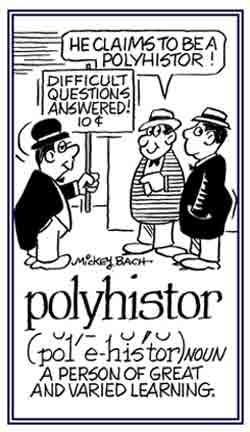histor-, histori- +
(Greek > Latin: historical narrative; past events, past knowledge)
1. A specialist in the discipline that records and interprets past events involving human beings.
2. Those who present the past as it is preserved in writing or in a body of knowledge.
2. Those who present the past as it is preserved in writing or in a body of knowledge.
historiography (s) (noun, historiographies (pl)
1. The body of literature dealing with past events collectively.
2. A group of techniques, theories, and principles of past research, scholarship, and presentation.
3. The narrative presentation of the past which is based on a critical examination, evaluation, and selection of material from primary and secondary sources and subject to scholarly criteria: "Mark was a historian who specialized in compiling medieval historiographies".
2. A group of techniques, theories, and principles of past research, scholarship, and presentation.
3. The narrative presentation of the past which is based on a critical examination, evaluation, and selection of material from primary and secondary sources and subject to scholarly criteria: "Mark was a historian who specialized in compiling medieval historiographies".
historiological (adjective), more historiological, most historiological
1. The knowledge or study of events from the past.
2. A discourse or science of chronological records or situations that occurred in the past.
2. A discourse or science of chronological records or situations that occurred in the past.
historionomer
Someone who is versed in the principles that regulate the course of history.
historionomical
histority
To record in or as history.
1. The study of the past through written records which are compared, judged for truth, placed in chronological sequence, and interpreted in light of preceding, contemporary, and subsequent events.
2. A systematically written account comprising a chronological record of events (as affecting a city, state, nation, institution, science, art, etc.) and usually including a philosophical explanation of the causes and origins of such events.
3. A continuous, systematic narrative of past events relating to a particular people, country, period, person, etc.; usually written as a chronological account.
4. Acts, ideas, or events that will or can shape the course of the future; immediate but significant happenings: "Firsthand observers of our space program see history in the making."
5. A drama representing historical events: "Shakespeare's comedies, histories, and tragedies."
11. Etymology: Greek historein, "learning by inquiry, knowledge obtained by inquiry; account of one's inquiries; narrative, historical narrative; history" through Latin historia, "narrative story, narration, account" through Old French and Middle English histoire, "past events, past knowledge".
2. A systematically written account comprising a chronological record of events (as affecting a city, state, nation, institution, science, art, etc.) and usually including a philosophical explanation of the causes and origins of such events.
3. A continuous, systematic narrative of past events relating to a particular people, country, period, person, etc.; usually written as a chronological account.
4. Acts, ideas, or events that will or can shape the course of the future; immediate but significant happenings: "Firsthand observers of our space program see history in the making."
5. A drama representing historical events: "Shakespeare's comedies, histories, and tragedies."
11. Etymology: Greek historein, "learning by inquiry, knowledge obtained by inquiry; account of one's inquiries; narrative, historical narrative; history" through Latin historia, "narrative story, narration, account" through Old French and Middle English histoire, "past events, past knowledge".
History is an ambiguous word. It refers both to what happened and to the process of telling what happened. In both cases the central problem is that the subject at hand is at best only partially recoverable. Even the deepest research and the highest imagination cannot bring the past fully back to life. Yet that is the ideal that historians find themselves pursuing.
microhistory
1. Historical study that addresses a specific or localized subject; a historical account of this nature, a case study.
2. A short account, a "potted" history.
2. A short account, a "potted" history.
mythistory
History mixed with myth; a mythologized version of history.
A person with extended and multiple knowledge: As a professor, Hugo is an author of many books about science, history, and classic languages; and so, he has been recognized as a polyhisor and scholar in many fields of learning.

© ALL rights are reserved.
Go to this Word A Day Revisited Index

Go to this Word A Day Revisited Index
so you can see more of Mickey Bach's cartoons.
polyhistoric
polyhistory
Pertaining to or referring to a polyhistor or a person of great and varied learning.
prehistoric (adjective); more prehistoric, most prehistoric
A reference to antiquity for which there is no documentary evidence: The prehistoric times took place before the written history of earlier or more recent cultures, civilizations, societies, and ways of life on earth.
prehistorical (adjective); more prehistorical, most prehistorical
Concerning the period existing prior to recorded chronicles or accounts of the past: Some archeologists have found and uncovered famous prehistorical settlements, confirming that they really existed!
Inter-related cross references, directly or indirectly, involving word units meaning "know, knowledge; learn, learning": cogni-; discip-; gno-; intellect-; learn, know; math-; sap-; sci-; sopho-.


